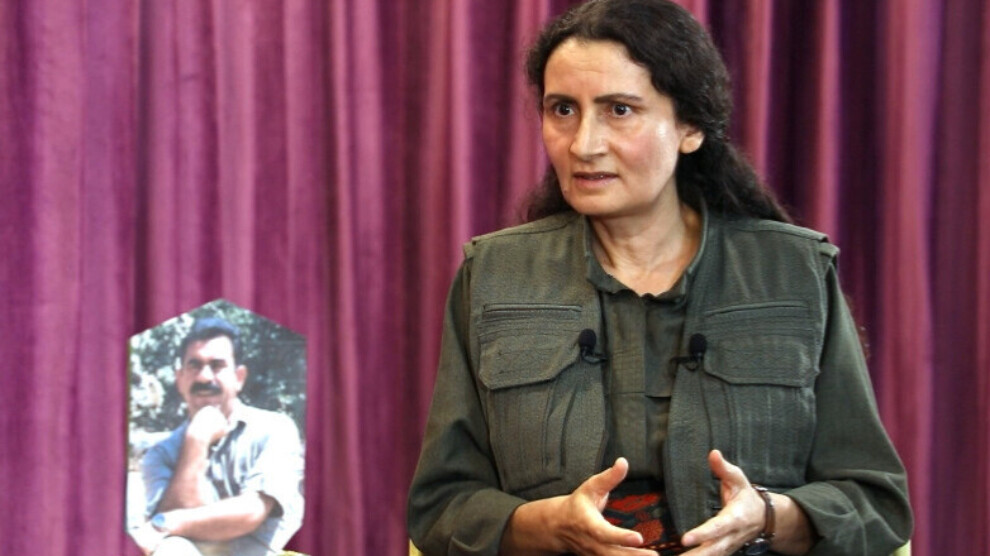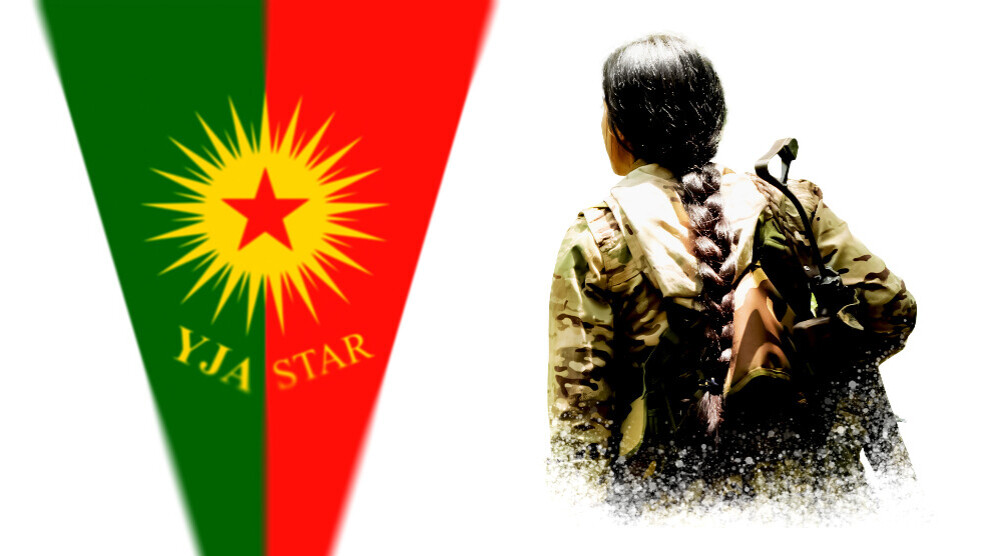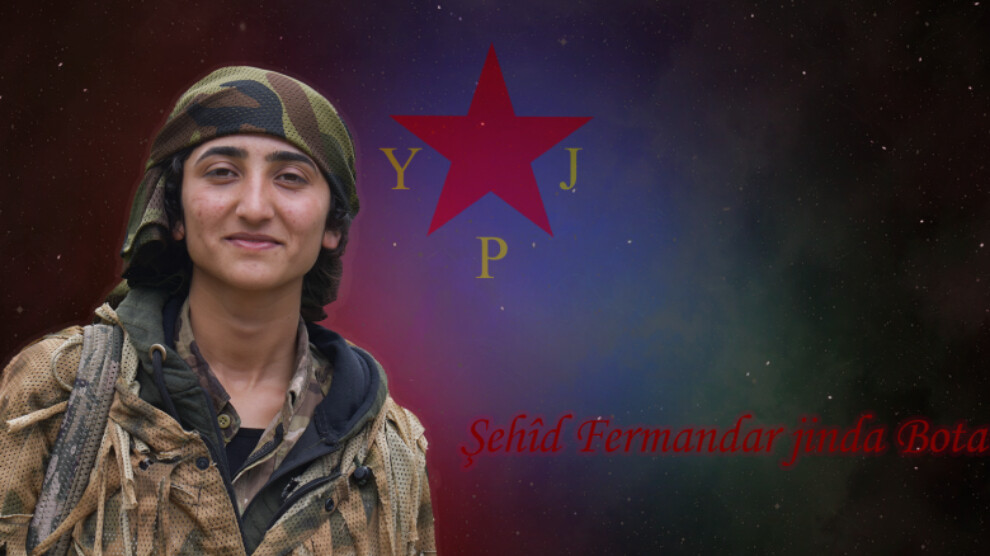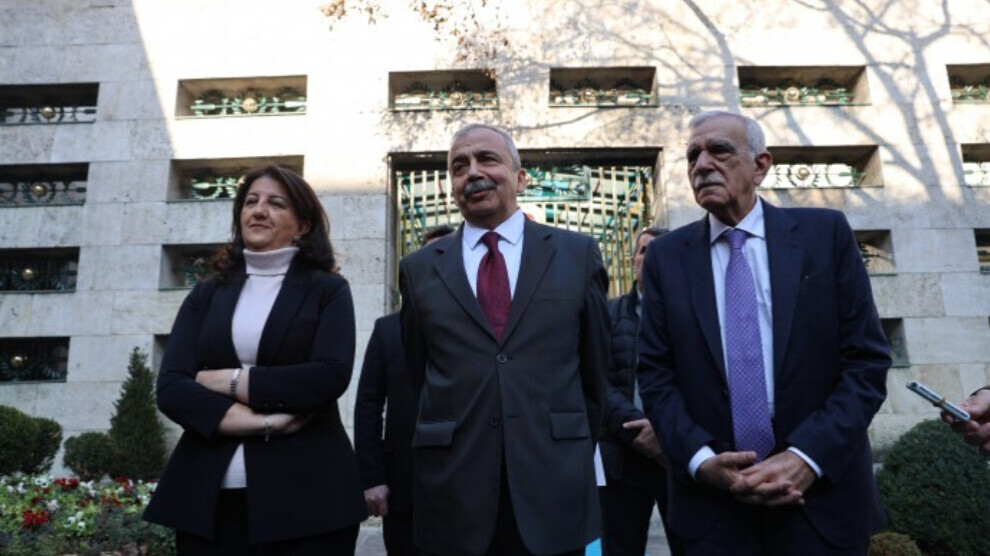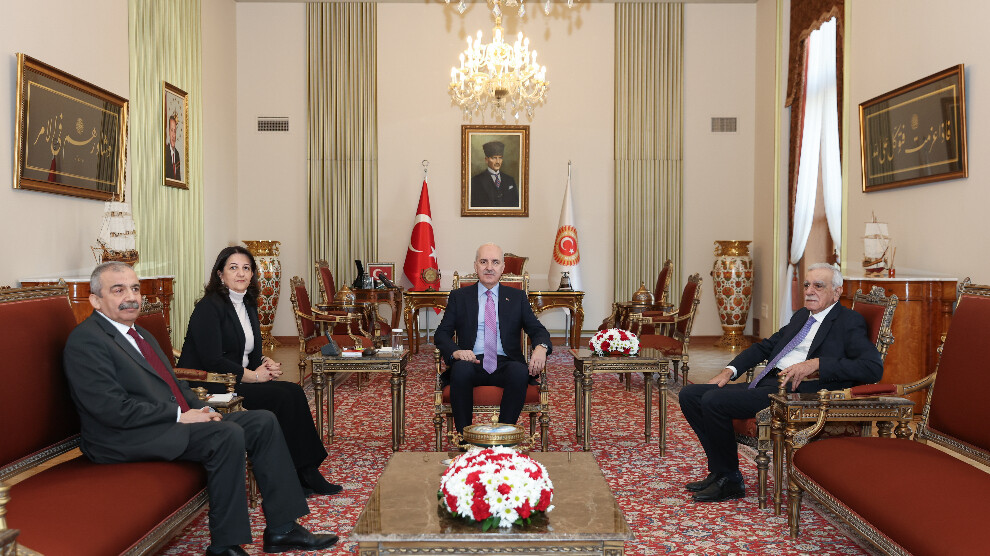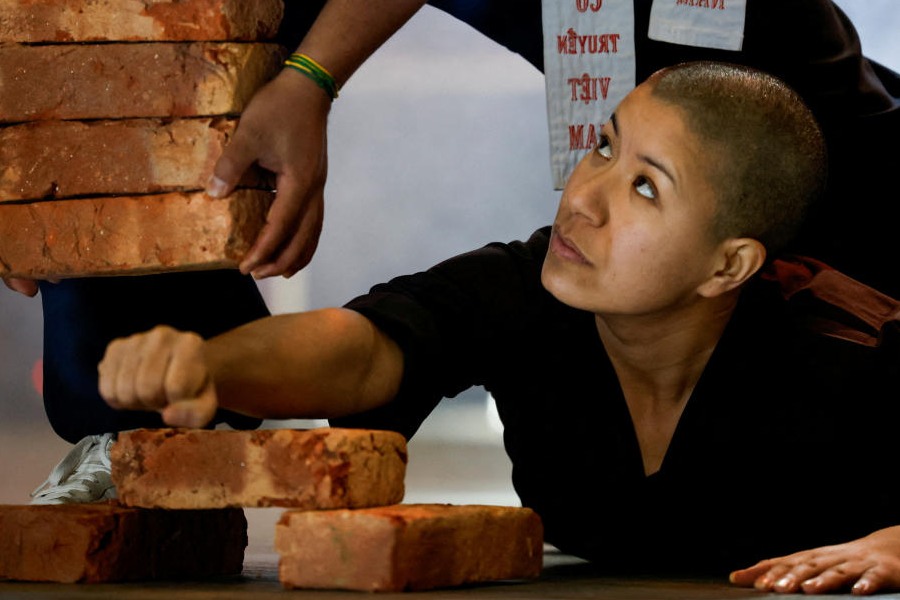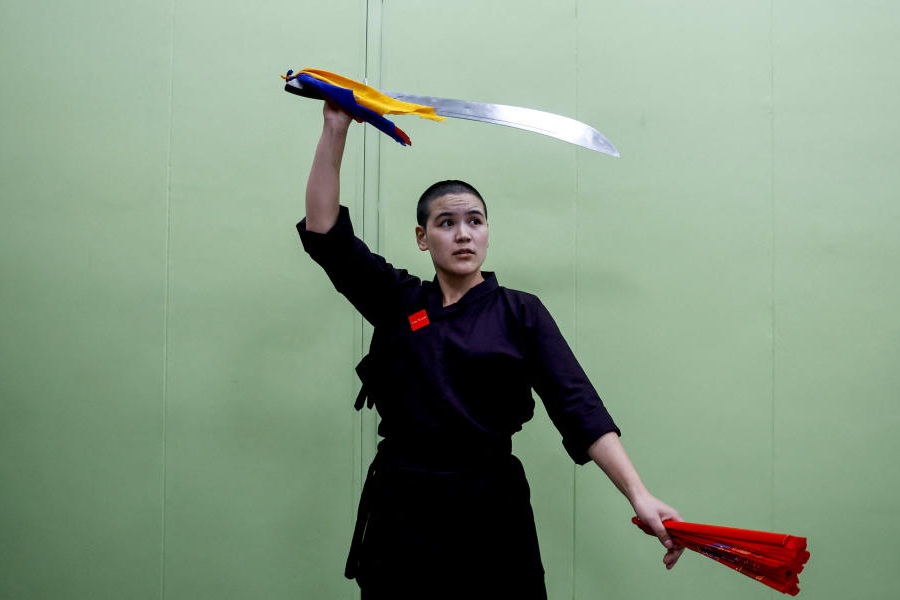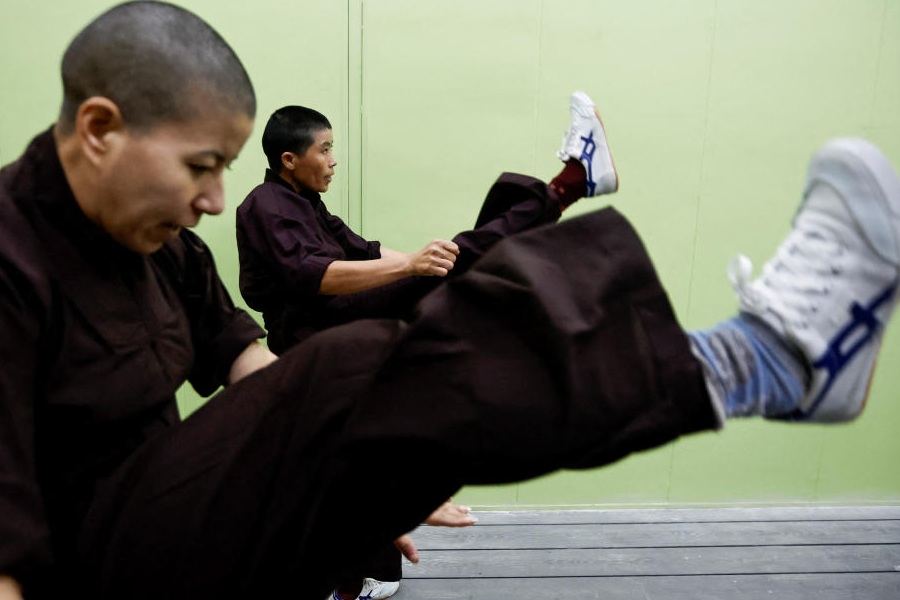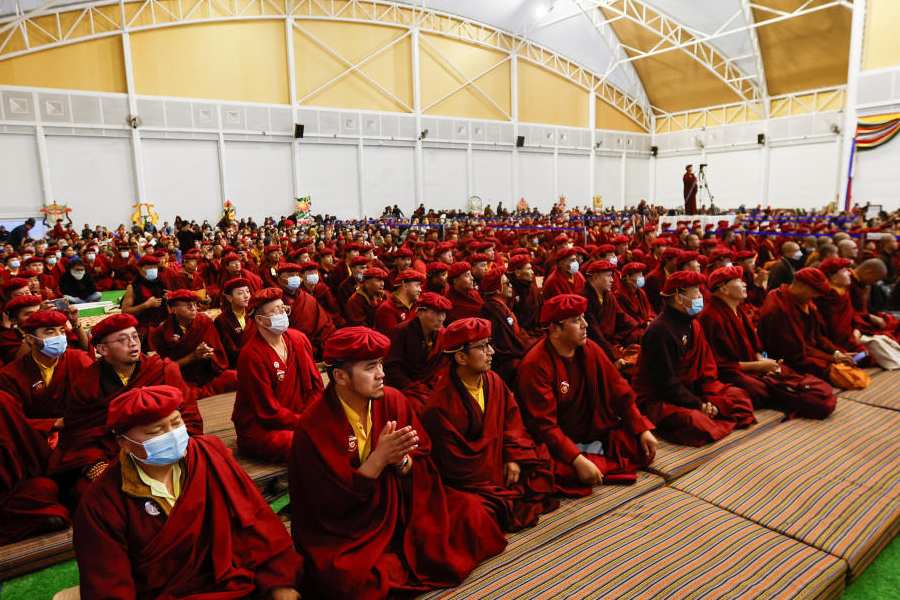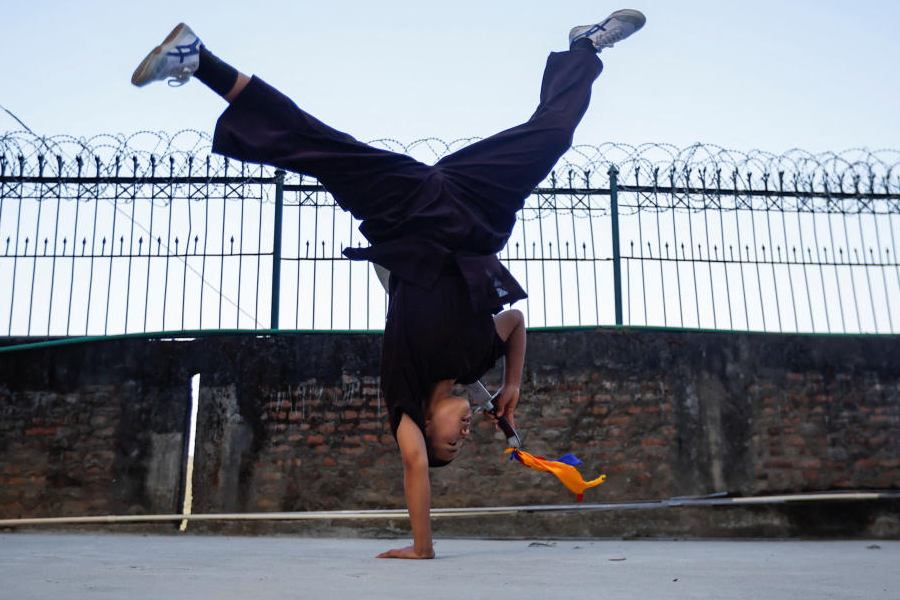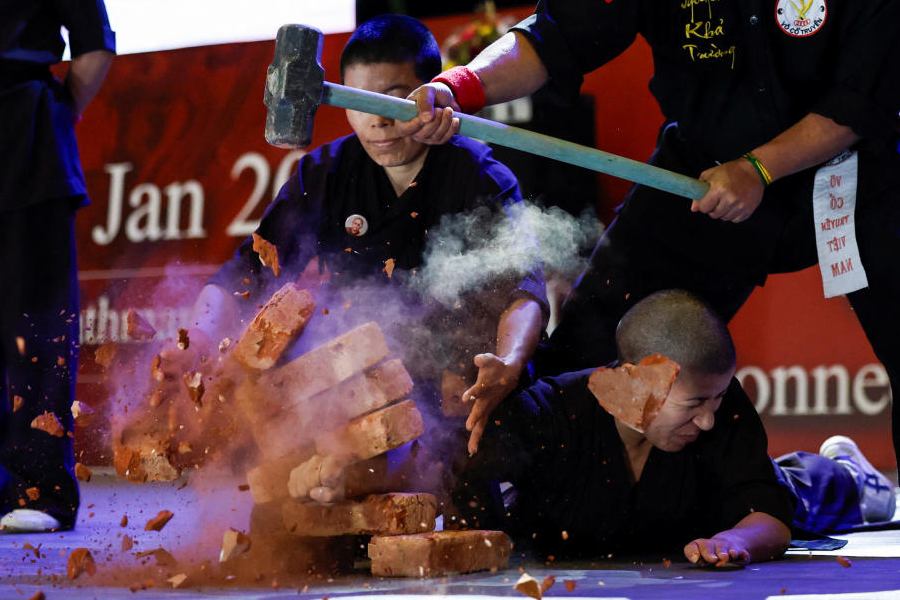"The only way out of the crisis of the nation states in the Middle East is through the model of the democratic nation", said Cemil Bayik.
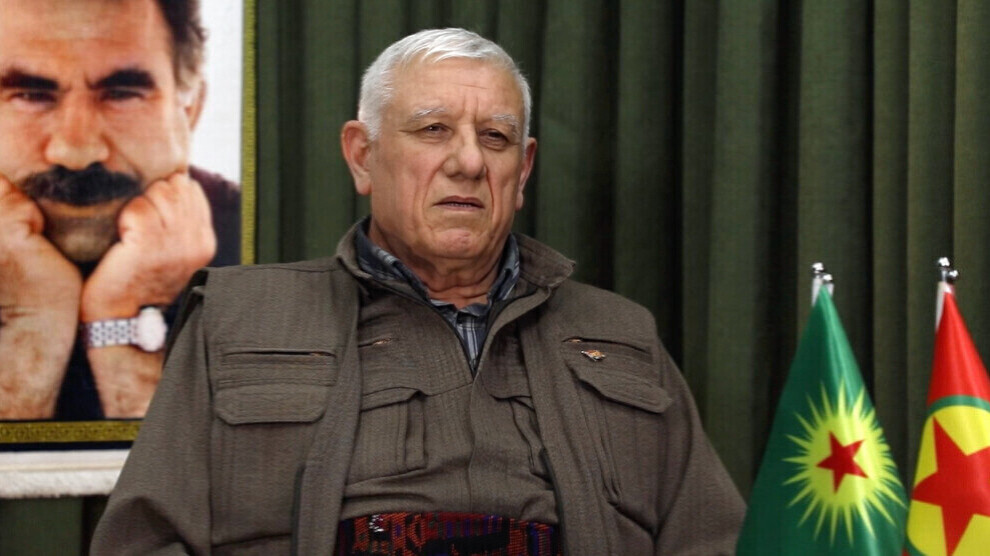
ANF
NEWS DESK
Wednesday, 1 January 2025, 12:02
In the third part of this in-depth interview, Cemil Bayik, co-chair of the KCK Executive Council, focused on the Third World War in the Middle East. Bayik talked in particular about the developments and results within the current process of the redesign of the Middle East and the role and opportunities for revolutionary forces.
Part one of this interview can be read here, while part two can be read here.
The old balances in the Middle East are breaking down, the status quo is disintegrating. What kind of Middle East, what kind of new design do the capitalist modernist powers envision in the future? Who will be the dominant powers of the new Middle East? In this context, what is the main purpose of Israel’s war against Hamas, Hezbollah, Iran, and the forces under its influence? Where do the developments that started on November 27 that resulted in Assad’s fall from power fit into these calculations?
At the beginning of the 20th century, when the Middle East was being shaped, there were two main goals. The first was to dismember the Ottoman Empire and establish dependent nation states in its place, and the second was to create a Jewish nation state in the Middle East and make it the dominant power in the Middle East. The Jewish nation state, which would later be declared as Israel, was essentially a project developed by Britain. On the basis of these two projects, the Middle East was designed. However, there were some unforeseen developments that led to partial changes in the plan. The most prominent of these developments was the October Revolution in Russia. When the October Revolution took place, the First World War was going on, and Russia was fighting on the side of Britain and France. However, when the revolution took place, Lenin pulled Russia out of the war and exposed the Sykes-Picot Treaty between England, France, and Russia, which was kept secret until then. With the disclosure of this treaty, the causes and goals of the First World War became known to the whole world. The Sykes-Picot Treaty determined how the Middle East would be designed and what the areas of power would be. This treaty has historical significance as it is the document that reveals that the First World War stemmed from the struggle for dominance over the Middle East.
After Russia withdrew from the war, a vacuum was created. The Kemalist movement took advantage of this vacuum. As it is known, Russia had occupied the region up to Bedlis (tr. Bitlis) during the war. When it withdrew from the war, it also left the occupied areas. Kurdish forces gathered there and reached a certain level of organization. When the Kemalist movement saw this, it turned its attention to Kurdistan. It developed relations with the October Revolution and received support from them. On this basis, the Kemalist movement increased its political and military influence. It won the war against Greece and took control of Anatolia. When Greece lost the war, the envisaged Treaty of Sèvres could not be implemented. Britain then made a partial change in its Middle East plan and concluded the Treaty of Lausanne with the Kemalist movement. Thus, the design of the Middle East was completed with Turkey’s involvement.
While the Middle East was being designed, the Turkish state was assigned two main tasks. The first is to function as a pre-Israel. This task was assigned to the Turkish state until the real Israel was established and became the dominant power in the Middle East. Thus, the Turkish state was constructed as a nation state model in the Middle East. It played the role as the responsible of both Israel’s security as well as the protector and developer of the interests of capitalist modernity in the Middle East. Therefore, Rêber Apo1 described the establishment of the Turkish state as the establishment of pre-Israel. Secondly, it was given the task of a buffer to encircle the Soviets from the south. As it is known, Turkey was later admitted to NATO for this purpose. This project developed by the forces of capitalist modernity is also the basis of the Kurdish genocide. Kurds were identified as the absolute enemy of the Turkish nation state, which was established based on a racist and fascist mentality. Through the pursuit of this enmity, the Turkish state has been turned into the power that most lies and serves the plans of capitalist modernity. This has continued unbroken from history to the present day.
Today, a new design is being developed in the Middle East. And by developing this new design, the current nation state form is being overcome. Undoubtedly, the redesign of the Middle East is not a process that started today. It is a phenomenon that came to the agenda with the collapse of real socialism. This process is extremely conflictual and painful. The main reason for this is, of course, conflicts of interest. There are conflicts of interest both between the capitalist modernist forces and mainly between the forces of global capital on the one hand and the status quoist forces on the other side. As it is known, the first intervention within the scope of the redesign of the Middle East was made in Iraq, when the Baath regime in Iraq was overthrown. Rêber Apo back then analyzed it and said that with the fall of Saddam, the nation state system in the Middle East collapsed. The developments have confirmed his analyses, as one after another, the nation state regimes in the Middle East have either fallen or turned into centers of conflict. This process is continuing in full strength today. And now, as it is known, the Syrian Baath regime, which represented the nation state in Syria, has also collapsed.
Within the scope of the redesign of the Middle East, the nation state model is being overcome, and instead models that serve the interests of global capital are being developed. At the beginning of the 20th century, the nation state model was still in line with the interests of capitalist modernity for the dissolution of the German, Austrian, and Ottoman empires. But this time has passed. Capitalist modernity is going through the process of globalization and has reached a critical dimension. Therefore, instead of the nation state model, smaller, more flexible, federative state structures are being developed. This is intended to secure the global circulation, investment, and profits of capital. Undoubtedly, just as in the creation of nation states, the method used in their overcoming is the divide-and-rule policy, which is one of the most distinguished methods of imperialism.
The Turkish state is the most concerned about this process for two main reasons. First, it sees that it cannot carry out the Kurdish genocide as before as the balance is being re-established against the nation state in the Middle East and as the Kurds have become an important power in the region. Secondly, Israel is now given the role of the main actor in the redesign of the Middle East. Again, Saudi Arabia is prioritized alongside Israel. Turkey, on the other hand, used to be in the forefront, but now it is being pushed back. In a way, the role given to Turkey has come to an end. Of course, Turkey is not being completely excluded or targeted by the system. Turkey is somehow still included in the plan, but it is not given a leading role as before. Today, both the absence of the Soviets and the presence of Israel have eliminated the old need for Turkey. Turkey has developed into a player that can be used when needed, but that is not crucial anymore. Especially Tayyip Erdogan is currently being used as a kind of battering ram. In the situation in Syria, it has become clear that he has been assigned such a role. The Turkish state aims to strengthen its position by putting itself to use and, based on this, to continue the Kurdish genocide. Because this is the main goal of the Turkish state. It is at a point where he is prepared to give up everything else, to leave everything else behind just to achieve this one goal. When it reaches a point that nothing else works, there is no compromise it is not ready to make and no plan it is not ready to enter into for this purpose.
When Israel took upon the role of the main actor in the new process, it was necessary to eliminate the structures that could form an obstacle to Israel’s new role. First Hamas, then Hezbollah, and finally Syria were targeted on this basis and accordingly ceased to be a threat to Israel. As is well known, Iran is behind these targeted forces. So, Iran is the target of this plan. A war is being developed that will spread wave by wave towards Iran. Now it is being discussed that this wave will spill over to Iraq. If future developments in Iraq are similar to those in Syria, Iran will find itself in an extremely difficult situation.
When the Middle East was being designed after the First World War, Iran was given a leading role along with Turkey. For 60 years, the Shahist regime in Iran was supported and protected by the capitalist modernity. But in the end, the Shah’s regime was unable to survive and collapsed. And so a compromise was made with the new regime, without engaging in a frontal confrontation, but by smoothing out the contradictions to a certain extent. Iran took advantage of this and tried to strengthen its position in the region, particularly after the fall of Saddam’s regime in Iraq in 2003. In 2011 again, it took advantage of the situation in Syria. Thus, Iran created forces outside its own borders that were loyal to it and acted on the basis of its interests. But now, as the Middle East is being redesigned, the elimination of these has seemingly become the top priority. Because as long as Iran maintains its position, it is not possible to make a new restructuring in the Middle East. That is why it was the first power to be targeted from the outside and weakened. It is not yet clear what will happen after this part of the plan is realized, whether there will be an intervention in Iran or whether Iran will make major concessions and become compatible with the system. But what is clear is that Iran is being removed from its current powerful position. It already is out of its former strong position, especially after the heavy blows on and weakening of Hezbollah. The loss of Syria is also a strategic loss for Iran.
What is the connection between these wars that are devastating our region, the Middle East, and the struggle for supremacy over the new energy and trade lines, as well as resources?
Of course, the relationship between these wars and material interests is very close. There is nothing in state civilization that is not directly related to materialistic interests and has them as its goal. State civilization is exclusively about materialism. That is why Rêber Apo called statist civilization “material civilization”. All wars from history to the present day that have been waged by the statist civilization have been for material purposes. Capitalist modernity is the civilization system that develops profit and consumption the most. That is why the gravest wars in human history have been fought during the period of capitalist modernity. Including the First and Second World Wars, all wars between the powers of capitalist modernity have been fought for the possession of energy routes, trade lines, and resources. The fact that the Middle East has been the center of wars for the last 150-200 years is due to both the energy resources it possesses and its location on energy lines.
In the system of capitalist modernity, the establishment and security of energy resources and trade lines has been the most fundamental issue. Every power that wants to be dominant has tried to seize and create energy resources and trade lines. This has been the main cause of wars. This issue is still not solved, and it today again is the reason for war.
Since the Middle Ages, the main interest for Europe was to possess the riches of the East (from the Middle East over Iran to India) and, to some extent, Africa. This deepened with the development of capitalist modernity. For this purpose, for example, Britain developed routes from the sea to India, and it struggled with the powers that jeopardized these routes and their security. Also, it patronized the Ottoman Empire for a long time in terms of the security of the road to India. However, when the Ottomans allied with Germany against Britain and jeopardized Britain’s routes, it changed this policy and destroyed the Ottoman Empire in the course of the war. The Middle East was shaped on the basis of the nation state model; the dismantling of the Ottoman Empire was therefore brought about compulsorily, and the forces of capitalist modernity paved the way for the exploitation of raw materials and energy resources and ensured the security of these routes.
To summarize, after the end of the bipolar world system with the collapse of the Soviet Union, the redistribution of control over the earth’s treasures and resources has come back to the agenda as the most fundamental issue. In fact, it has never been totally off the agenda. The forces of capitalist modernity have not reached a consensus on this issue. After the end of the bipolar world system, the search and competition over new energy routes increased again. And many powers have developed projects on a macro and micro level, some of which failed, some succeeded. However, China has been the power that has developed the most serious projects at the macro level. China wanted to solve this issue by developing relations with as many powers as possible and developing joint projects. The most serious and realistic of these projects was the northern energy line, which connects China and Europe, including India, Iran, and Central Asian countries. Again, China had further projects, but the US has significantly disrupted these. By dragging Russia into the Ukraine war, it disabled the northern route. Finally, at the G20 meeting in India in September 2023, the corridor project, called ‘India–Middle East–Europe Economic Corridor’ (IMEC) was announced. This energy and trade line connects India, the Gulf, and the Middle East to Europe via Cyprus. The current developments in the Middle East are based on ensuring the security of this line and eliminating the obstacles in front of it. The war for this has reached Syria and led to the fall of the Baath regime. However, it can be stated that it will not stop there and that further ‘problematic areas’ for the system will be targeted.
What is the position of Iran and Turkey in this ongoing war between the monopolistic global capitalist powers and the regional status quoist forces? What influence have the wars to redesign the region had on the two countries, and how will this influence change?
As I pointed out, when the Middle East was being designed after the First World War, Turkey and Iran were assigned the role of the dominant powers over the region. That is what they both have historically been. Both had survived and become strong as a result of their reciprocal relationship with the Kurds. When their time came and they were given a leading role as nation states, their relationship with the Kurds was once again decisive. But this time, they relied on the denial and absolute oppression of the Kurds. They collaborated in the genocide of Kurds and created a joint administration over Kurdistan, including Iraq. Thus they continuously suppressed the Kurdish question.
At this time, Israel was still in its founding and construction phase. Its future was still uncertain. The Arab-Jewish contradictions and conflicts were very deep. Arab nationalism and Baathism were developing against Israel, relying on the Soviets and partly on China. It took them a long time to break Arab nationalism and eliminate the question regarding Israel’s right to exist. As is well known, the first blow to Arab nationalism was the so-called Six Day War in 1967. The blows continued one after the other. Finally, it came to the fall of the Baath regime. Incidentally, it should be noted that the movements of the Muslim Brotherhood were also developed by the US and Britain in order to break the power of Arab nationalism.
Now, as the Middle East is being redesigned, the two dominant powers of the region, the Turkish and Iranian nation states, are the most challenged. Due to their status quoist structures, they are in conflict with the forces of global capital. Since the nation state status quo cannot be expected to withstand the interests of the global capital system, they either collapse in the course of interventions from outside or transform themselves and become compatible with the new design. As seen in the case of Syria, the nation state status quo has little ability or wisdom to undergo transformation. Neither Syria has been able to do so, nor its predecessors. Because this requires a certain democratization. And this is the least found in the nation state mentality. That is why we are currently in a phase in which interventions and destruction are at the forefront.
With the redesign of the Middle East, the leading role previously given to Turkey and Iran has been given to Israel and Saudi Arabia. Therefore, the new energy and trade lines have been established, and the Abraham Accords, envisaging an end to the Arab-Jewish conflict, were concluded. The end of the Arab-Israeli contradiction and conflict in the Middle East is a crucial factor, since it has been one of the reasons why Turkey and Iran were given a leading role in the previous period. As a matter of fact, Turkey and Iran were the powers that benefited the most from this conflictual relationship. Now, Turkey and Iran have taken a position against the current process. But neither are they in a position to confront the system nor to develop an alternative to it. On the one hand, there are fears, anxieties, and reflexes; on the other hand, there mainly is a quest to preserve their positions in the new period and to strengthen them if possible. As far as Iran is concerned, it is mainly a question of the survival of the regime. Lebanon, Syria, Iraq, etc., are the trump cards it holds. But the more cards it loses, the more the future of the regime is jeopardized. It has already lost some of them. It is not clear whether the system of capitalist modernity will accept a compromise with it or whether it will try to smash and directly attack it. It looks like Iran is trying to find a way to compromise, but the position of the axis on the other side, consisting of the USA, the UK, and Israel, is remaining hidden.
As far as the Turkish state is concerned, it faces at least as many challenges and dangers as Iran. It does not have the same severe problems regarding its regime and the protection of it as Iran has. The Turkish state can use both secular nationalism and religious nationalism together. After the coup of September 12, secular nationalism was replaced by religious nationalism in Turkey. Although some call this a regime change, in reality what happened was not a change of regime but a deepening of the existing monist nation state structure and mentality. It is not internal factors that make the Turkish state problematic for the system, but external efforts, and this is due to the existence of the Kurdish question. The Turkish state’s main concern and fear is the Kurds. And since it has an anti-Kurdish mentality, it expects all external developments and changes to serve the Kurdish genocide. It opposes any development that does not correspond to this. In this respect, it is the force that is most resistant to change. It has a structure that can enter into any kind of relationship, provided that it does not negatively affect the policies of Kurdish genocide. It is this rigid and unprincipled character that makes the Turkish state extremely useful. This is the approach of the Turkish state to the developments in the Middle East. It views the developments in the Middle East with great concern and stands against change because it fears that the Kurds can benefit from the new situation that will emerge, that they can become a power, that they can gain new statuses. Therefore, it shows a strong resistance against change. But when it sees that change is taking place in spite of itself, it gets involved in the plan, opposes it, and uses its political, military, and diplomatic power to ensure that the developments are in its favor. This is exactly what it has been doing in Syria. It abandoned Russia and Iran, with whom it had collaborated together in Syria for years, and joined the plan of the US, which it supposedly stands against. To assess its approach to Syria is also important in terms of revealing how the Turkish state will act in the redesign of the Middle East.
What is the approach of the Kurdish freedom movement, which is struggling to create a democratic confederal alternative based on the model of the democratic nation, towards this conflict of interests? What kind of dangers are there for the Kurds? What will be the status of Kurds and Kurdistan in the new Middle East?
The only way out of the crisis of the nation state in the Middle East is through the model of the democratic nation. Neither the models to be developed by the forces of global capital nor the existing nation state structure can form a solution to the existing problems. The current nation state system is the source of the problems. It cannot be expected to develop a solution. Neither can the models that are being developed by the forces of global capital on the other side. Maybe they can play a driving role in overcoming the nation state, but they cannot form a solution. The nation state model was developed by the capital system. Now, under the conditions of global capitalism, a contradiction has emerged with it. This is because the nation state structure is not compatible with the interests of global capital. Therefore, it is being discarded. What is wanted to be done here is not to overcome the nation state as a mentality but to develop a new political system in line with the interests of global capitalism. The monist, individualist, materialist, usurping, power-striving, and sovereigntist mentality within the nation state continues to exist. Unless these are overcome and an alternative is pushed forward, a real solution to the problems will not be possible. The struggle between the forces of global capital and the status quo of the nation state will not bring about a result that is in favor of the peoples. Maybe some can benefit from it, but a solution will not develop from it.
It is the democratic struggle for freedom by the peoples, particularly by the women and revolutionary democratic forces that can and will develop a solution. This solution takes shape and comes to life through the model of the democratic nation and democratic confederalism. Democratic confederalism is the best solution for accommodating and sustaining social diversity. Considering the diversity of religion, language, sect, ethnicity, and culture in the Middle East, the potential and power of the model of democratic nation and democratic confederalism can be better understood.
The world is currently in the midst of the Third World War. All the developments taking place today are taking place within the scope of the Third World War, which was caused by the crisis of capitalist modernity. The parties to this war are capitalist modernist powers; in other words, it is a war within the system. Both the wars between the hegemonic powers and the contradictions and conflicts between the global powers and the status quo powers are within the system. There is no ideological difference between them. They are all based on the ideology of capitalist modernity. But there are two ideologies today. There is capitalist modernity on the one side and democratic modernity on the other. In the Third World War, the conflicting parties are the forces based on the ideology of capitalist modernity. The struggle between them is a struggle of interests. In essence, they are all fighting against society and nature. They are waging a war to dominate them. The position of revolutionary democratic forces is different. Our line is the line of democratic modernity. This is an ideological difference. We do not side with any of the forces that are in conflict with each other over the dominance of nature and society. Revolutionary democratic forces are not a party to this war. Revolutionary democratic forces are engaged in ideological, political, and military struggle with the forces of capitalist modernity, which are parties to this war.
When conceptualizing these, it is important to do this with a clear understanding of each of the dimensions of ideological struggle and the dimension of political solution. We ideologically represent the second line. As I mentioned above, apart from the two ideological lines, there is no third ideological path or line. However, while waging an ideological struggle against capitalist modernity, we are also developing an alternative politics. With this, we aim for an alternative solution based on the democratic communal life of society against the politics of the warring parties in the context of the Third World War. This is defined as the third political line. The third political line is alternative politics. It draws its strength from society and struggle. It is possible to create development on the basis of the third political line, especially by taking advantage of the conflict between the forces of global capital and the status quoist forces. Rêber Apo put forward the formula of state + democracy. The essence of this is that the state will accept the existence of society (organized society), like this, a consensus can be reached with the state. The formula of state + democracy stands as the most functional solution method.
As for the situation of the Kurdish people in particular, the Kurdish people waged a great struggle under the leadership of our movement at a time when they were oscillating between existence and non-existence. It gained new life through struggle and underwent a significant transformation. They gained national consciousness, will, and identity and experienced a revolution of resurrection. The Kurdish people adopted the mentality according to the model of democratic nation. It gained awareness and sensitivity regarding self-defense, experienced a great enlightenment with the new paradigm developed by Rêber Apo, and educated itself on the basis of democracy, social ecology, and women’s freedom. It would not be an exaggeration to say that it is now the most political, organized, and dynamic force in the Middle East. We are definitely a people who look to the future with hope. As a movement, we are stronger than ever. Of course, there are serious dangers ahead of us. The genocidal colonialist Turkish state has not given up its genocidal aims. On the one hand, it is worried and frightened by the developments in the Middle East, on the other hand, it is taking advantage of the opportunity to see if it can liquidate and genocide the Kurds. We are aware of how it is trying to use the new situation in Syria and how it is mobilizing its military, political, and diplomatic power to turn this process into the liquidation of Rojava. This is the main danger. The only way to frustrate this is an all-out resistance based on the strategy of revolutionary people’s war. This is the road to success. 2025 will be a year in which our people achieve victory. The Kurdish people do not seek any sovereignty; they are struggling to develop a free, equal, and common life with the peoples in the countries where they exist. This legitimate, democratic struggle of our people will definitely succeed.
